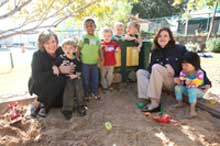Baylor University Receives Grant for Inclusion Classroom
Follow us on Twitter: @BaylorUMedia
The Baylor University Piper Center for Family Studies and Child Development has received a $40,000 grant from The Special Hope Foundation to create a classroom in which children 18 months to 3 years old with special educational needs will learn alongside children who are developing typically.
The Palo Alto, Calif.-based foundation supports programs for the developmentally disabled. The Piper Center's goal is to have a ripple effect, serving as a model for community child care centers seeking more inclusive environments. Working with children with special needs while they are very young not only benefits them but also helps other children accept those who are different from them.
McLennan Community College Child Development Center, Lake Shore Baptist Children's Center in Waco and Little Cougar Inc. in China Spring were selected this week to participate with Piper, which serves children from ages 2 months to 5 years and is the laboratory school for Baylor's department of family and consumer sciences, said Barbara Crosby, director of the center and a part-time lecturer in the department of family and consumer sciences in Baylor's College of Arts and Sciences.
The grant will be used to hire a teacher with a bachelor's degree in child development with experience in developmentally appropriate classrooms and children with special needs. The grant application was researched and written by Annie Humphreys, who earned her bachelor's degree in family and consumer sciences from Baylor in May.
The first week in January 2011 is the target date for the classroom to begin operating. It will be used for eight children, two of them with special needs.
While many centers serve children with special needs, the inclusion approach is different because it "actually engages them in learning by meeting them where they are developmentally," Crosby said. "Children can learn a lot, even as infants. But they aren't being engaged or worked with enough. If we can begin early enough, there are children that may not have to go to special education when they reach school age, and that saves taxpayers money.
"One of the greatest things that the other children learn is empathy -- not 'Oh, my gosh, that child doesn't talk. They're weird.' Instead, they look at them as a friend who just doesn't talk much," Crosby said. "Empathy is saying, `He's different from me -- he's in a wheelchair -- but we can still play.' It's amazing the empathy and compassion and acceptance they can have as opposed to being in a bubble." 
Piper has five classrooms grouped by age -- infants, toddlers, 2-year-olds, 3-year-olds and pre-kindergarten -- and already has space for the new, multi-age classroom. A vendor will donate needed equipment, including tables, chairs, shelving, cots, cubbies and play equipment.
The concept of inclusive classrooms in early education and care is relatively new to Central Texas, Crosby said. Inclusion schools do not distinguish between general education and special education but are structured so all students learn together from an early age.
"We want to do this not only to provide training for our students but also for the three centers working with us," Crosby said. "We want to raise the level of inclusion in child care centers in the community. We want other centers to come and observe in our classrooms twice a month so they can learn more about inclusion, and then our teachers will go to their centers once a month to provide mentoring."
Pat Summers, director of Little Cougar Inc., said she is excited about working with Baylor.
"More and more, it seems we have children with special challenges," she said. "It's important to come together as a community and have resources so we can search for the best way to help them succeed. You handle things the best way you can, but if you don't have a sounding board, you don't have the confidence to know you're handling the situation in the best possible way for the child and for those who work with them."
Joyce Nuner, an assistant professor of family and consumer sciences at Baylor, said she has spoken with many area families who have children with special needs, and "what we've found is that there aren't a lot of centers that feel equipped for this. A child may be accepted into a program and then asked to leave, which can be devastating for the families.
"We need to have more people trained to understand and have strategies that work and that have a willing attitude," she said. "For some teachers, there's fear of the unknown. They may not have been around a child with cerebral palsy or Down syndrome. I think a willing attitude comes from seeing inclusion can be successful."
While Piper is small, serving about 60 children, "we're teaching lots of people, whether students or professionals in the community," she said.
The Piper Center at Baylor is a laboratory for all majors in the department of family and consumer sciences, including child and family studies, fashion design, fashion merchandising, general family and consumer sciences with or without the option to teach, interior design and nutrition. Students from other Baylor academic units, such as the department of psychology, the School of Education and the School of Social Work, also use the lab.
The center's curriculum encourages children to express ideas through such means as storytelling, art, movement, construction, writing and interaction with others.
Waco's Klaras Children's Center will identify the two special needs children for the classroom, Crosby said. Klaras is the Early Children Intervention program for families of children who have problems with development and/or behavior. It serves children from newborn until they reach age 3.
Contact: Terry Goodrich, Assistant Director of Media Communications, (254) 710-3321